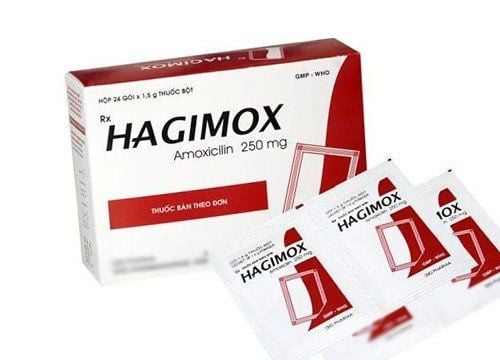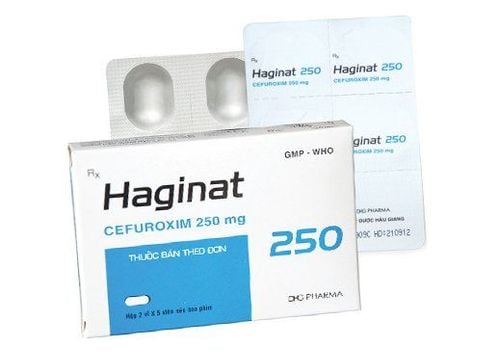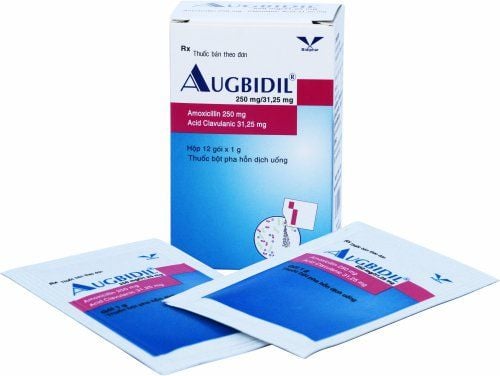This is an automatically translated article.
Medopiren 500mg drug has the main ingredient is Ciprofloxacin, this is an antibiotic of the Quinolone group that helps kill bacteria by inhibiting their gyrase enzyme. The drug is effective against gram-negative and gram-positive bacteria.
1. Uses of Medopirin 500
Medopiren 500mg is indicated for the treatment of infections with bacteria that are still susceptible to Ciprofloxacin.
Ciprofloxacin is a synthetic antibiotic, 4-quinolone derivative, with bactericidal effect. By inhibiting the enzyme DNA gyrase, the drug inhibits the function of bacterial DNA. Ciprofloxacin is active against most Gram-positive and Gram-negative bacteria and on some anaerobes such as Chlamydia spp. and. Mycoplasma spp.
2. Indications of Medopiren 500mg
Medopiren 500mg is indicated for the treatment of infections caused by pathogens still sensitive to Ciprofloxacin such as:
Infections of the biliary tract: cholangitis, cholecystitis, pus-filled gallbladder; Bone and joint infections; Ear, nose and throat infections: otitis media, sinusitis, infections caused by Gram (-), not indicated in the treatment of acute tonsillitis; Eye infections: bacterial conjunctivitis; Intestinal infections; Gonorrhea infection; Abdominal infections; Infections of the uterus and ovaries: endometritis, pelvic inflammatory disease, salpingitis...; Respiratory tract infections: acute/chronic bronchitis, severe acute pneumonia due to cystic fibrosis, bronchiectasis, empyema, bronchopneumonia. lobar pneumonia. Do not use Medopiren 500mg as a first-line drug in the treatment of pneumonia caused by Pneumococcus, however, it can be indicated in the treatment of pneumonia caused by Gram (-); Skin and soft tissue infections: abscesses, burn infections, cellulitis, erysipelas, otitis externa, infected ulcers; Systemic infections: severe cases such as sepsis, peritonitis, immunocompromised, intensive care patients; Urinary tract infections with/without complications: epididymitis, prostatitis, pyelonephritis, urethritis; Prophylaxis: in cases of high risk of infection laparoscopic or intestinal surgery; Children: Ciprofloxacin can be used in children and adolescents aged 1 to 17 years for the 2nd or 3rd choice treatment in complicated urinary tract infections and pyelonephritis and for the treatment of pyelonephritis. treatment of cystic fibrosis with severe acute pneumonia caused by P. aeruginosa in children from 5 to 17 years old; Treatment with Medopiren 500mg should only be initiated after careful assessment of the benefits and risks because Medopiren 500mg may have adverse effects involving joints and/or surrounding tissues. For other indications of Medopiren 500mg in children, clinical experience is limited.
3. Dosage and how to use Medopiren 500mg
Dosage of Medopiren 500mg depends on indications, severity and location of infection, sensitivity of Medopiren 500mg on pathogenic bacteria, age, weight, kidney function.
The duration of treatment with Medopiren 500mg depends on the clinical severity of the disease and the bacteriological development. In some infections (such as Pseudomonas aeruginosa, Acinetobacter or Staphylococci) a higher dose of Medopiren 500mg may be required and may be used in combination with other antibiotics.
Dosage of Medopiren 500mg:
In adults:
Mild - moderate infections: dose 250 - 500mg/time, 2 times a day. Severe infections, complications appear: dose 750mg / time, 2 times a day for 5 - 10 days. In children: Dose 10 - 20mg/kg each time, 2 times/day, maximum 750mg/time.
For each different treatment purpose, Medopiren 500mg will have different doses, patients need to see a doctor for advice on appropriate dosage. Medopirin 500mg is available as a film-coated tablet for oral administration. Patients need to create a habit of taking the medicine on time, at the prescribed dose, swallowing the tablet whole, avoiding biting, which may affect the absorption of the drug.
The drug is taken regardless of meal time, if taken on an empty stomach, the active ingredient can be absorbed faster, but it should not be taken at the same time.
4. Contraindications of Medopirin 500mg
Do not use Medopiren 500mg in cases of hypersensitivity to ciprofloxacin or other quinolones or to any of the excipients. Medopiren 500 mg and tizanidine should not be used concurrently due to the risk of increased serum tizanidine concentrations leading to increased undesirable effects (eg, hypotension, somnolence, somnolence).
5. Side effects of Medopiren 500mg
Undesirable effects of Medopiren 500mg are mainly nausea, diarrhea and rash. Bacterial and parasitic infections: fungal infections; oral thrush, vaginal thrush ; gastrointestinal fungi. Hematological and lymphatic system: Eosinophilia; anemia, granulocytopenia, thrombocytopenia; Hemolytic anemia Immune system: allergic edema, angioedema, dyspnea, laryngeal edema; reactive shock (life-threatening). Metabolism and nutrition: Anorexia; Increased blood glucose. Heart, kidney and nervous system: Headache, dizziness, somnolence, taste disturbances (usually reversible after drug discontinuation); major epileptic seizures Visual disturbances, color disturbances.
6. Interactions of Medopiren 500mg
Anticoagulants: Medopiren 500 may prolong bleeding time; Cyclosporin: A transient increase in serum creatinine was observed when Medopiren 500 was co-administered with cyclosporin. Therefore, patients should be monitored regularly for blood creatinine levels for these cases; Fenbufen: In animal studies, the use of nonsteroidal anti-inflammatory drugs such as Fenbufen with high doses of quinolone antibiotics (such as Medopiren 500) may lead to seizures (except Acetylsalicylic acid); Glibenclamide: In special cases, the concomitant use of Medopiren 500 with Glibenclamide may increase the hypoglycemic activity of Glibenclamide; Metoclopramide may increase the absorption of Medopiren 500 ; Methotrexate: The renal tubular transport of Methotrexate may be impaired when administered concomitantly with Medopiren 500, thereby increasing serum concentrations and increasing the risk of Methotrexate toxic reactions; Drugs containing multivalent cations or minerals (such as calcium, magnesium, aluminum, iron...): Avoid concomitant use with Medopiren 500 or, if combined, should be taken at least 4 hours apart; Polymeric phosphate binders (such as sevelamer), sucralfate or antacids containing magnesium, aluminum, calcium will reduce the absorption of Medopiren 500 ; Use of Medopiren 500 before surgery: Serum ciprofloxacin concentrations are reduced if co-administered with opioids such as papaverinum or anticholinergics such as Atropine or Hyoscine. Therefore, this combination should be replaced by a benzodiazepine group; Phenytoin : Concomitant use with Medopiren 500 may change the concentration of Phenytoin in the blood; Probenecid interferes with the renal excretion of ciprofloxacin, therefore, concomitant use increases the serum concentration of ciprofloxacin; Drugs metabolised by CYP1A2: Ciprofloxacin inhibits CYP1A2 and will increase the serum concentration of drugs metabolized by this enzyme system (e.g. Theophylline, Clozapine, Tactile, Ropinirole, Tizanidine, Duloxetine); Theophylline: Concurrent use of Medopiren 500 may increase the serum concentration of Theophylline, thereby causing side effects of this active ingredient. Patients should check theophylline blood levels, and theophylline dose may be reduced if the combination is required; Dairy products: Medopiren 500 should not be co-administered with dairy products or mineral-fortified beverages (eg, milk, yogurt) due to the risk of decreased absorption of Ciprofloxacin. However, dietary calcium does not significantly affect the absorption of Medopirin 500.
Please dial HOTLINE for more information or register for an appointment HERE. Download MyVinmec app to make appointments faster and to manage your bookings easily.













